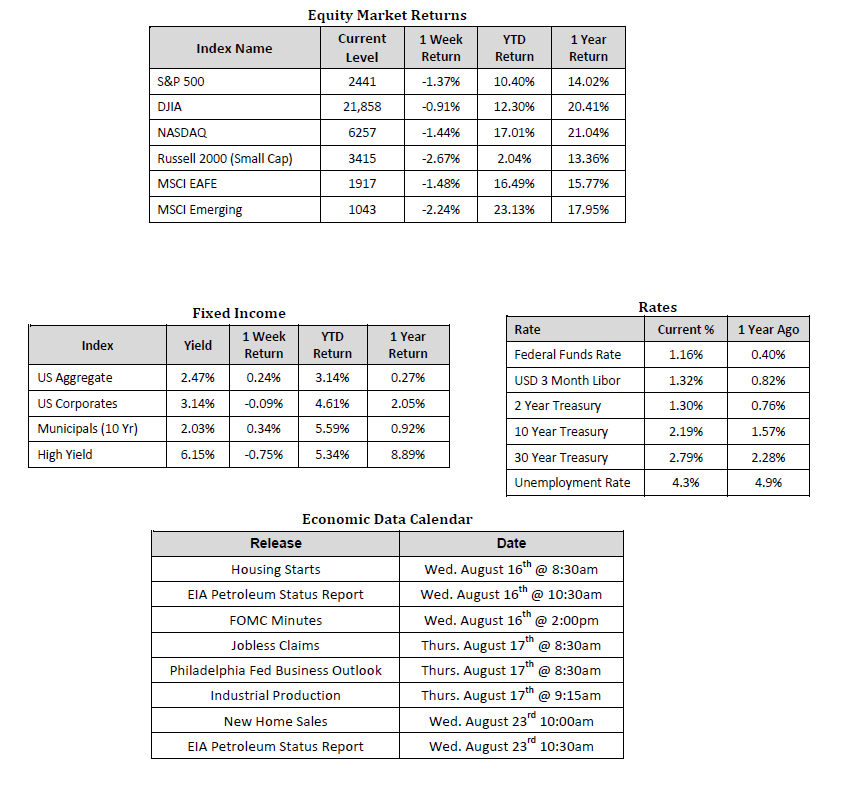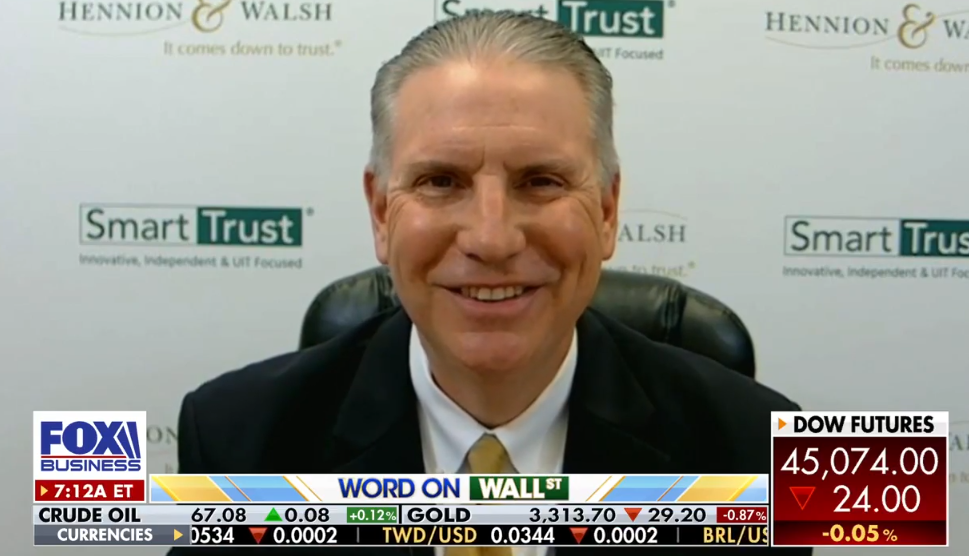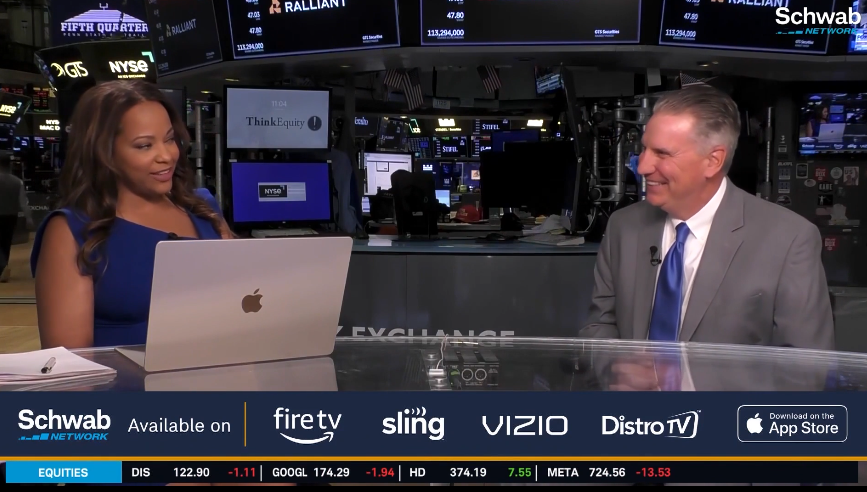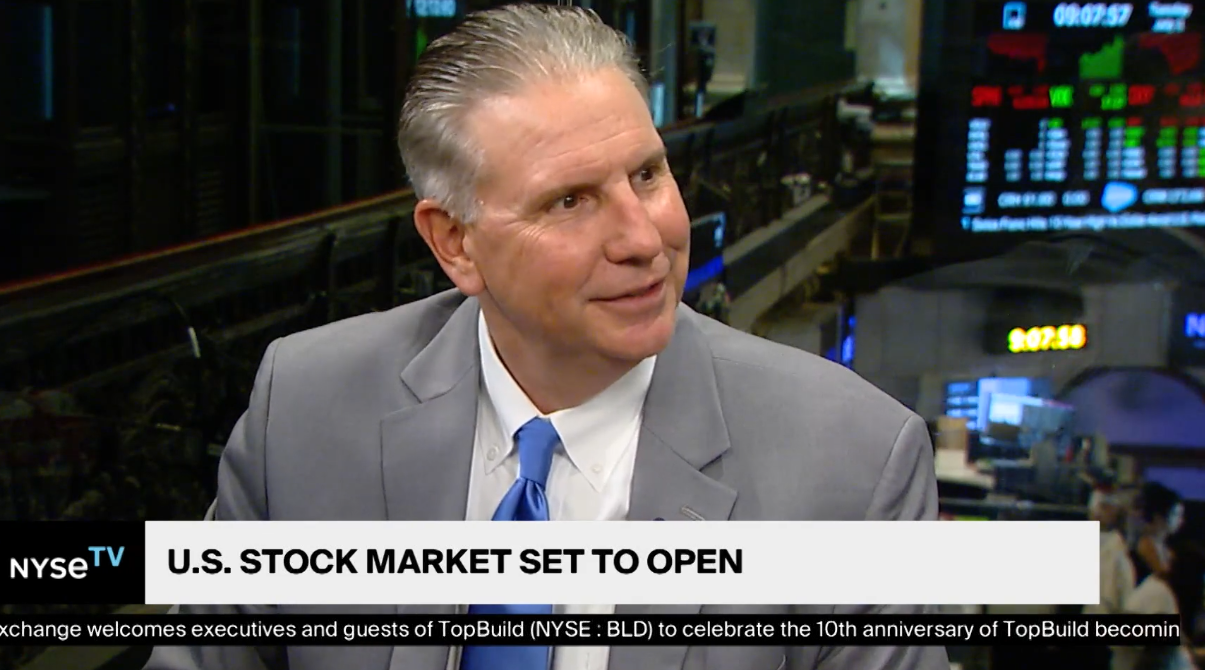
Risk Off Mode Hits Markets
Market Overview
Sources: Sources for data in tables: Equity Market and Fixed Income returns are from JP Morgan as of 8/11/17. Rates and Economic Calendar Data from Bloomberg as of 8/14/17. International developed markets measured by the MSCI EAFE Index, emerging markets measured by the MSCI EM Index. Sector performance is measured using GICS methodology. S&P 500 earnings data from Factset as of 8/11/17.
Happening Now
A war of words between U.S. President Donald Trump and North Korean Leader Kim Jung Un caused stock markets around the world to sell off last week while bonds and gold rallied. The S&P 500 Index fell 1.4%, the Russell Midcap Index fell 1.9%, and the Russell 2000 Index declined 2.7% last week. Internationally, Developed Markets ended the week 1.5% lower while Emerging Markets dropped 2.2%.
So far this year, favorable sentiment and a benign macroeconomic environment has helped moderate the type of price swings equity investors traditionally experience. The Volatility Index (VIX) has held steady at historical lows for the majority of 2017 but reverted quickly on Thursday, jumping 44%, following an escalation of tensions between the U.S. and North Korea. Last week should serve as a reminder that at any point in time there is the potential for an exogenous shock to hit the market. It is important for investors to differentiate between shocks that are likely to dissipate over the near term and those that can serve as a catalyst for an economic regime change. While numerous factors can influence a corporation’s stock price, we believe that at the aggregate level, the majority of the stock market’s performance can be attributed to economic growth flowing through to corporate profits. Geo-politics are a real risk to not only the capital markets, but to millions of innocent civilians around the world. Until there is a high probability of a confrontation that could weigh on economic growth, however, we do not believe that rhetoric alone will lead to a sustained sell-off in equities.
We encourage investors to consider the market’s performance last week and use it as a gauge to measure their own risk tolerance. The lengthy period of low volatility we have experienced can have the effect of lulling investors to sleep and lead to an apathetic approach to portfolio management. Anyone holding equities should be prepared for a sudden drop in stock prices and should set their expectations accordingly.
Important Information and Disclaimers
Disclosures: Hennion & Walsh is the sponsor of SmartTrust® Unit Investment Trusts (UITs). For more information on SmartTrust® UITs, please visit www.smarttrustuit.com. The overview above is for informational purposes and is not an offer to sell or a solicitation of an offer to buy any SmartTrust® UITs. Investors should consider the Trust’s investment objective, risks, charges and expenses carefully before investing. The prospectus contains this and other information relevant to an investment in the Trust and investors should read the prospectus carefully before they invest.
Investing in foreign securities presents certain risks not associated with domestic investments, such as currency fluctuation, political and economic instability, and different accounting standards. This may result in greater share price volatility. These risks are heightened in emerging markets.
There are special risks associated with an investment in real estate, including credit risk, interest rate fluctuations and the impact of varied economic conditions. Distributions from REIT investments are taxed at the owner’s tax bracket.
The prices of small company and mid cap stocks are generally more volatile than large company stocks. They often involve higher risks because smaller companies may lack the management expertise, financial resources, product diversification and competitive strengths to endure adverse economic conditions.
Investing in commodities is not suitable for all investors. Exposure to the commodities markets may subject an investment to greater share price volatility than an investment in traditional equity or debt securities. Investments in commodities may be affected by changes in overall market movements, commodity index volatility, changes in interest rates or factors affecting a particular industry or commodity.
Products that invest in commodities may employ more complex strategies which may expose investors to additional risks.
Investing in fixed income securities involves certain risks such as market risk if sold prior to maturity and credit risk especially if investing in high yield bonds, which have lower ratings and are subject to greater volatility. All fixed income investments may be worth less than original cost upon redemption or maturity. Bond Prices fluctuate inversely to changes in interest rates. Therefore, a general rise in interest rates can result in the decline of the value of your investment.
Definitions
MSCI- EAFE: The Morgan Stanley Capital International Europe, Australasia and Far East Index, a free float-adjusted market capitalization index that is designed to measure developed-market equity performance, excluding the United States and Canada.
MSCI-Emerging Markets: The Morgan Stanley Capital International Emerging Market Index, is a free float-adjusted market capitalization index that is designed to measure the performance of global emerging markets of about 25 emerging economies.
Russell 3000: The Russell 3000 measures the performance of the 3000 largest US companies based on total market capitalization and represents about 98% of the investible US Equity market.
ML BOFA US Corp Mstr [Merill Lynch US Corporate Master]: The Merrill Lynch Corporate Master Market Index is a statistical composite tracking the performance of the entire US corporate bond market over time.
ML Muni Master [Merill Lynch US Corporate Master]: The Merrill Lynch Municipal Bond Master Index is a broad measure of the municipal fixed income market.
Investors cannot directly purchase any index.
LIBOR, London Interbank Offered Rate, is the rate of interest at which banks offer to lend money to one another in the wholesale money markets in London.
The Dow Jones Industrial Average is an unweighted index of 30 “blue-chip” industrial U.S. stocks.
The S&P Midcap 400 Index is a capitalization-weighted index measuring the performance of the mid-range sector of the U.S. stock market, and represents approximately 7% of the total market value of U.S. equities. Companies in the Index fall between S&P 500 Index and the S&P SmallCap 600 Index in size: between $1-4 billion.
DJ Equity REIT Index represents all publicly traded real estate investment trusts in the Dow Jones U.S. stock universe classified as Equity REITs according to the S&P Dow Jones Indices REIT Industry Classification Hierarchy. These companies are REITSs that primarily own and operate income-producing real estate.




